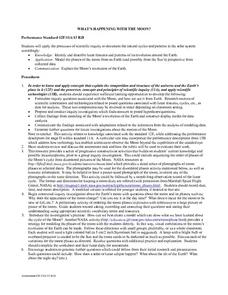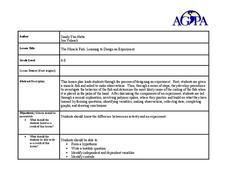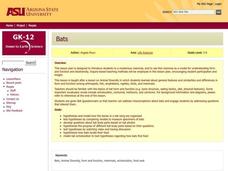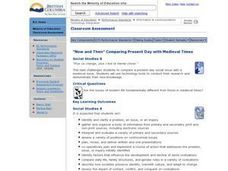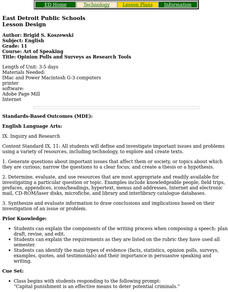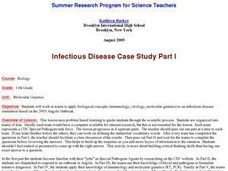Curated OER
What's Happening With the Moon?
Students review the process of scientific inquiry. Using this information, they identify the patterns and cycles of the moon as it revolves around the Earth. In groups, they model the phases of the moon from the Earth and Sun's...
Curated OER
The Robot Explorer
High schoolers design a robotic vehicle to explore underwater caves. In this robot technology lesson, students brainstorm, research, and report about a robotic vehicle design capable of sensing objects and taking appropriate actions to...
Curated OER
Insect Models
Learners construct an insect model. In this "insects" science and art lesson, students complete a KWL chart about 'insects," then view several interactive websites to become familiar with insect traits. Learners construct an insect model...
Curated OER
The Miracle Fish: Learning to Design an Experiment
Students develop procedures to explore the behavior of fish. For this scientific experiment lesson students from a hypothesis, write a question, identify different variables and controls in their experiment.
Curated OER
Biomedical Imaging
Students use guided questions and research to compare two biomedical imaging methods. they effectively present their findings to the class. Students use new technical knowledge to summarize and compare new techniques with those they...
Curated OER
Bats
Students model how the bones in a bat wing are organized. They develop questions about bat body parts based on photographs. They hypothesize how bats locate their food.
Curated OER
"Now and Then" Comparing Present Day with Medieval Times
Eighth graders compare a present-day social issue with a medieval issue. They use technology tools to conduct their research and demonstrate their new knowledge. Students present their findings to the class in the form of a PowerPoint.
Curated OER
How Do The Colors of Light Mix?
Students investigate the mixing of light. They form a hypotheses to reason why color changes occur and they write conclusions and ask new questions arising from the investigation. Students identify the primary and complementary colors of...
Alabama Learning Exchange
Wet Heads
Middle schoolers apply the steps of the scientific method to an experiment. They complete an instructional activity of scientific inquiry and use a spreadsheet software to create a graph illustrating data gathered.
Curated OER
Systems of the Body
Third graders gather information by questioning, forming hypothesis, collecting and analyzing data, reaching conclusions and evaluating results, and communicating procedures and findings to others. Then they demonstrate an understanding...
Curated OER
Day of the Dead
Students study the Mexican celebration of Day of the Dead. They view a video and research questions on the Internet. They synthesize the information from the websites and the topic for their RAFT writing assignment. They write their...
Curated OER
Secrets from the Sea
Students utilize technology for research. They research the potential causes of the sinking of the Hunley.
Curated OER
Discover the World of Machines
Students participate in a project which incorporates science with reading, writing, social studies, and technology. Through several activities over a 15 day period, they explore the computer, digital camera, computer software programs...
Curated OER
Water Quality in the Greenhills Stream
Seventh graders conduct year long study of water quality over different seasons using variety of probes, including D.O., pH, conductivity and temperature, that are attached to portable technology. Students select three data points in...
Curated OER
Engineering
Students examine how Shell uses engineering. In this engineering principles lesson plan students visit a web-pages, answer questions, and examine the ways that engineers go about exploring different ideas.
Curated OER
Will Biotech Crops Solve World Problems?
Young scholars read an online article to examine what biotechnology and agricultural biotechnology are. They answer questions and complete worksheets based on the article's information.
Curated OER
DNA in a "Snap"
Students observe a model of DNA and answer probing questions like, "What does this model represent?" They then work in small groups to construct an accurate model of DNA per rubric provided and present to the class explaining their model...
Curated OER
Sun Friendly Homes
Students design and build a model solar energy home. In this technology instructional activity, students test the efficiency of their model houses by measuring temperature at regular intervals. They analyze data and share results with...
Curated OER
Great Monuments of the World
Students explore the wonders of the world through inquiry. In this world monuments lesson, students investigate famous landmarks around the world as they conduct and apply research. Students create products that feature their findings...
Curated OER
Opinion Polls And Surveys As Research Tools
Eleventh graders determine, evaluate, and use resources that are most appropriate and readily available for investigating a particular question or topic. Examples include knowledgeable people, field trips, prefaces, appendices,...
Curated OER
Civil War
Fifth graders discuss the causes of the Civil War and write a paragraph summarizing each identified event. In the computer lab, 5th graders create a PowerPoint presentation explaining events leading up to the Civil War. They use the...
Curated OER
ToxMystery Lesson Plan 1: Introduction to Common Household Chemical Hazards
Pupils participate in ToxMystery, a computer game, where they discover potential environmental health hazards in rooms of a common household. In this lesson on household safety, students first brainstorm possible hazards in the...
Curated OER
Streamlines and Breadlines
Students explore the Great Depression. In this Great Depression lesson plan, students research selected websites and analyze primary sources to conduct inquiries regarding the depression, northern migration, and urbanization. Students...
Curated OER
Infectious Disease Case Study Part I
Eleventh graders work together to complete a simulation on infectious diseases. They determine which concepts affect a disease more. They complete discussion questions as well.
